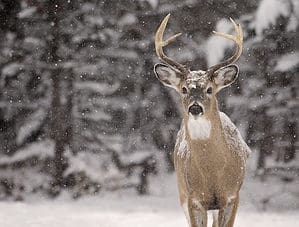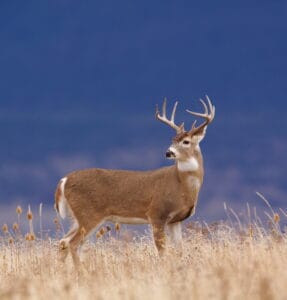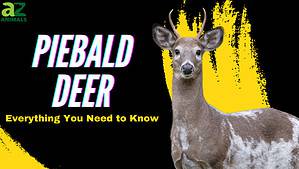In New Jersey, deer season is from early September until early February. The New Jersey Department of Fish and Wildlife (NJFW) is responsible for managing the wildlife population in the state. To control the deer population, the hunting seasons, zones, and bag limits are established and adjusted each year as needed. The state is divided into 70 different deer zones.
While each can have different seasons and bag limits, they are grouped together and have similar season types and dates. Typically, the seasons open in each zone around the same time, but some seasons may close earlier in some zones.
Let’s look at the required licenses, important regulations, and approved weapons below. These regulations can be a bit complicated at first, but most rules are guided by a few underlying principles.
Requirements for Hunting Licenses and Permits
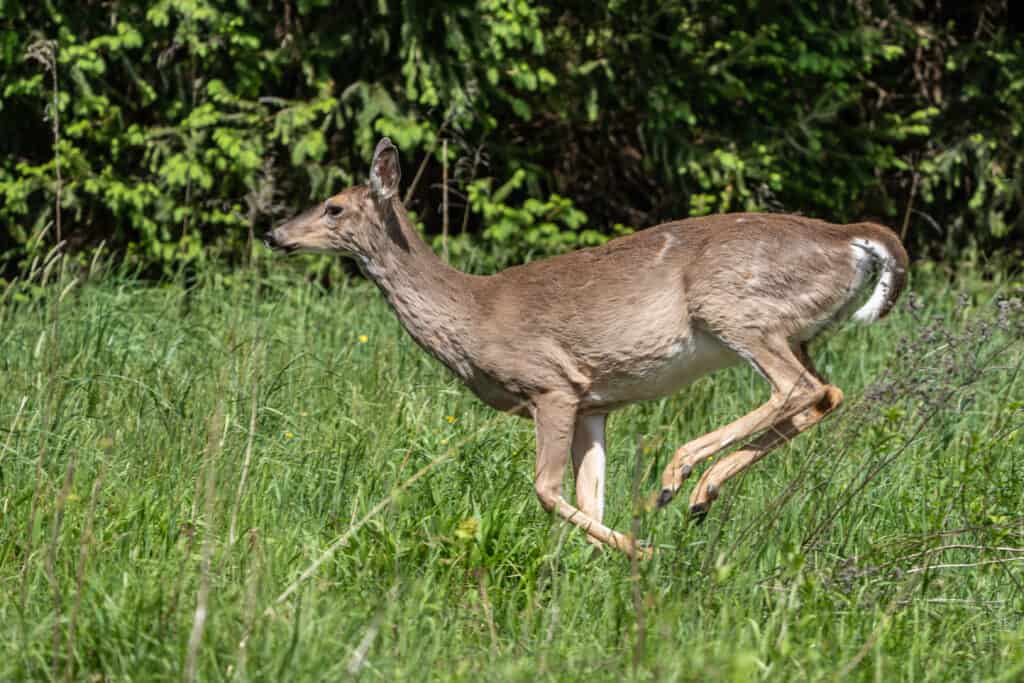
Hunting deer in New Jersey requires a license.
©Amy Lutz/Shutterstock.com
Anyone over the age of 10 that wants to hunt in New Jersey is required to purchase a New Jersey hunting license. Hunters must purchase the license that corresponds to the season and hunting device they want to hunt with.
Youth hunters between ages 10 and 16 must request a Bow and Arrow or Firearm Hunting License that is currently free of charge. For residents of New Jersey that are over 16 years of age, hunting licenses are issued in three different versions: Bow and Arrow, Firearm, and All-Around Sportsman.
The All-Around Sportsman license includes the Bow and Arrow license, a Firearm license, and a Fishing license. There are also discounts for these licenses for seniors over the age of 65. Hunters who do not live in New Jersey, are over 16 and want to visit the state to hunt need to purchase a New Jersey nonresident license.
Like residents, nonresident hunters must purchase either a Bow and Arrow hunting license or a Firearm hunting license.
In addition to the hunting licenses described above, hunters may be required to obtain deer permits to harvest deer during certain seasons. Rifle Permits are issued for youth hunters and adults who want to use a Rifle during the firearm season.
There are permits for the Permit Bow season, Permit Muzzleloader season, and Permit Shotgun season. These permits are issued for certain deer zones, antlerless or antlered deer, and Youth or Adult hunters.
Hunting licenses and permits can be purchased in two ways. They can also be purchased in person from an authorized license agent. Agents are typically sporting goods retailers such as Bass-Pro or Walmart. A list of retailers is available in the New Jersey hunting and trapping digest on the NJFW website.
Hunter Safety Course Requirements
All hunters who want to purchase a hunting license must either present a previous resident hunting license of the appropriate type from New Jersey or another state or a hunter safety course completion card. For hunters that have not completed the hunter safety course, courses are available in New Jersey in an online study and in-person field day format.
Students must first complete the HunterCourse.com online program. This program covers both Bow and Firearm and has a 100-question test at the conclusion. After successfully completing the online portion, students must then attend a live-fire session. This session has two separate disciplines that must be registered for and completed at different times.
Anyone who wants to try hunting before completing the course can buy an Apprentice Hunting license. This type of license allows anyone 18 years old or older to try hunting with a shotgun or anyone 14 years old or older to try archery hunting. Hunters using an apprentice license to hunt must be accompanied by a hunting mentor that is 21 years old or older.
The mentor must have a valid New Jersey hunting license that is for the same season as the apprentice. The apprentice must be under the direct supervision of the mentor at all times. Apprentices cannot hunt with a rifle or purchase a rifle permit. Only two apprentice licenses per type can be purchased in a hunter’s lifetime.
Deer Seasons in New Jersey
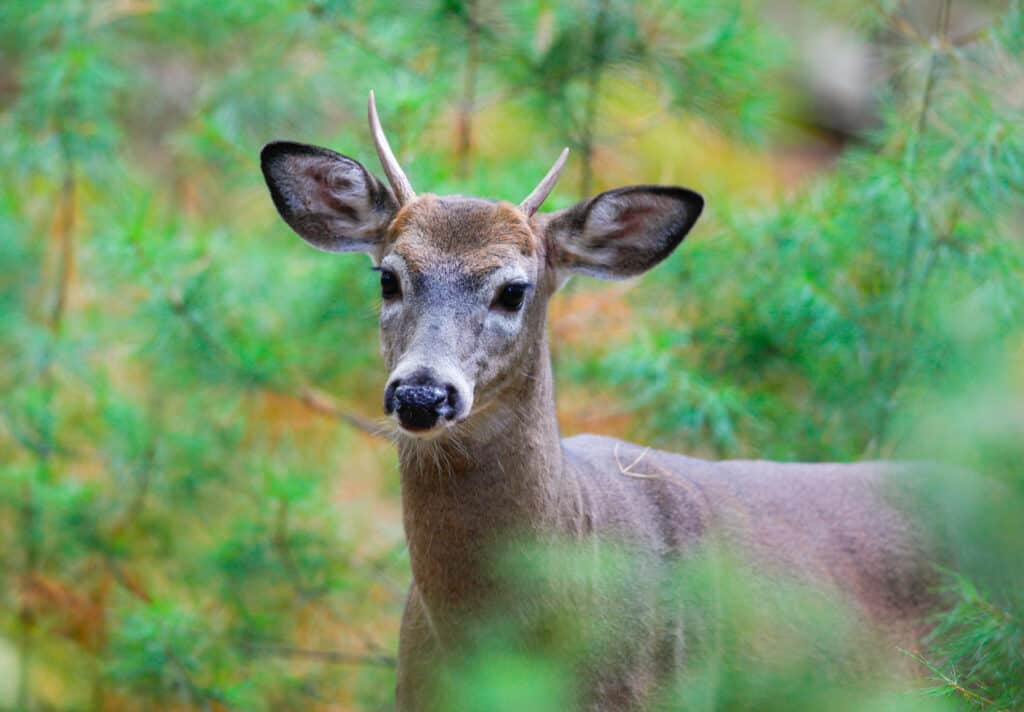
There are three deer seasons in New Jersey.
©iStock.com/Louise Wightman
New Jersey has three basic deer season types: Bow, Muzzleloader, and Firearm. During each of these seasons, certain weapons may be used. Each of these season types can make up different seasons in different zones.
For bow season, there is a Fall Bow Season, a Youth Day, a Permit Bow Season, and a Winter Bow Season. For the Muzzleloader season, there is a Permit Muzzleloader season. During the Firearm season, there is a Youth Day, a Permit Shotgun season, and a six-day Firearm season.
The season dates and bag limits for each of these seasons vary by zone and are defined as “regulation sets.” The New Jersey Hunting and Trapping Digest have more information on the regulation sets, the zone maps, and tables of the seasons and bag limits for each zone.
Be sure to understand the zone you want hunt in since many of them could be confused easily, and review the regulation set for that zone and season that you plan to hunt.
Accepted Weapons
The Bow, Muzzleloader, and Firearm seasons have different regulations for the weapons that are allowed during each season. Below is a summary of each and more information on each season.
Bow Season
During the Bow season, archery equipment such as longbows, compound bows, recurve bows, and crossbows are allowed. Longbows and recurve bows must have a minimum draw weight of 35 pounds at full draw.
Compound bows must have a minimum peak draw weight of 35 pounds. Crossbows must have a minimum draw weight of 75 pounds, a stock length of at least 25 inches, and only fire one arrow at a time.
Arrows must have well-sharpened metal broadheads at least ¾” in diameter. Hand-held release devices for bows may be used. Firearms of any type are prohibited during this season
Muzzleloader Season
During the Muzzleloader season, muzzleloading firearms may be used. These firearms must have percussion, flintlock, or inline ignitions and use black powder or black powder substitutes such as Pyrodex and Triple Seven.
Hunters must have a valid rifle permit to hunt with a muzzleloader. Muzzleloading rifles must be at least .44 caliber and fire a single projectile. Muzzleloading shotguns must be at least 20 gauge, not more than ten gauge, and fire a single projectile or buckshot that is at least #4 size. Telescopic sights are allowed.
Firearm Season
During Firearm season, shotguns, muzzleloading firearms, and air guns may be used. Modern rifles may not be used for deer hunts in New Jersey. Shotguns must be at least 20 gauge, not more than ten gauges, and fire a single projectile or buckshot that is at least #4 size. They must not be capable of holding more than three shells simultaneously.
Note that if the season is a shotgun season, muzzleloading rifles may not be used. Air guns are shoulder-fired guns that use the force of a spring or compressed air to expel a projectile that is at least .177 caliber and no larger than .22 caliber. The projectile velocity must be at least 600 feet per second at the muzzle and cannot be BBs.
Youth Deer Hunting Days
There are two Youth Day seasons in New Jersey. The first is for Archery equipment only and is usually on the fourth Saturday in September. Bows may be used as described for the Bow season above.
The second is usually the third Saturday in November, and Firearms may be used as described for the Firearm season. Youth hunters have to be between the ages of 10 and 16 and accompanied by an adult at least 21 years old with a valid license for the season. The youth hunter must be under the direct supervision of the adult and must be together in the same tree stand or blind.
Overall Regulations and Safety Information

Hunters that kill or wound a deer must make a reasonable effort to retrieve and use the animal.
©Khalil Ahmed/Shutterstock.com
In New Jersey, there are several critical rules that deer hunters should be aware of. This list is a summary and is not a complete, all-inclusive list of all of the rules. Hunters should review the current regulations before hunting each season.
Hunting licenses must be visible on a hunter’s outer clothing and not covered by a bag or harness. Hunters using firearms must maintain a safety zone of 450 feet from a building or school playground. Hunters using bows must maintain the same distance from school playgrounds and 150 feet for buildings. This rule applies of the building is occupied or not.
Hunting hours are ½ hour before sunrise to ½ hour after sunset. Hunting from or across a highway or road is prohibited.
Natural lures such as cervid-derived urine may not be sold, possessed, or used.
Using dogs to pursue deer for hunting purposes is prohibited. Using drones to harass or locate deer while hunting is prohibited. Possessing or using a noise suppressor on a firearm is prohibited.
Firing from or possessing a loaded firearm while in a vehicle is prohibited. Using light to aid in locating or shooting deer is prohibited. When firearm season is open, hunters must wear a solid daylight fluorescent orange cap or an outer garment with at least 200 square inches of orange visible from all sides. A hunter-orange camo pattern is prohibited.
Hunting with a firearm on Sunday is prohibited. Hunting Deer with a bow on Sunday is only legal in state Wildlife Management areas and private property. Hunters must have the landowner’s permission to hunt on private property. Hunters that kill or wound a deer must make a reasonable effort to retrieve and use the animal.
An antlered deer is a deer with at least one antler at least 3 inches long
Chronic Wasting Disease Concerns in New Jersey
Chronic Wasting Disease (CWD) is a brain and nervous system condition that affects deer. It also affects elk, moose, and other animals in the cervid family. The disease is progressive in nature and always fatal. An infectious protein causes the disease called a prion.
It is transmitted to deer through contact with a diseased deer or from contact in the environment. The prions are shed from the infested deer in their urine, saliva, and feces. Deer congregating around a food source greatly increases the chances that the disease will spread if it exists in the area. An ill deer can shed the prions before they start to appear sick. Symptoms include lack of coordination, excessive salivation and thirst, emaciation, confusion, and loss of fear of humans.
While CWD has been detected in many US states and Canada, it has not been detected in New Jersey as of 2022. To prevent the possible disease introduction, the NJFW has banned the import of any live cervid or the whole carcass of a harvested cervid into the state. If a deer is harvested in another state, it must be processed before it can be imported into New Jersey.
Boned-out meat, clean skull caps, hides, shed antlers, and clean upper teeth may be imported. Any heads must be finished taxidermy mounts. Any lures or scents made from deer are also banned since the prions can exist in deer urine or glandular secretions. Only synthetic lures or scents can be used
Transportation Tags
Once you have harvested a deer, you must immediately fill out a deer transportation tag and attach it to your deer. Be sure to fill out all of the information on the tag correctly. After tagging the deer you may field dress it and transport it.
Next, you must report your harvest to the NJFW. This can be done on a smartphone or computer online by visiting NJFishandWildlife.com/ahrs.htm. You can also call in to report the harvest by calling 855-I-HUNT-NJ.
When you report your harvest, you will be given a Confirmation number that should be written on the green Antlerless or Buck tag. The confirmation number should be kept for as long as you have the deer or any of its parts. Throughout the season, hunters should record all deer harvested and the confirmation numbers. This should be done using the green tags mentioned, and they should not be separated from your license.
Fines for Violations
Taking a deer illegally in New Jersey can result in fines, loss of hunting privileges, and sometimes even jail time. Any equipment that was used to harvest a deer illegally could also be confiscated. New Jersey is a member of the Interstate Wildlife Violators Compact. This agreement between states allows them to share information on wildlife law violators. If a law is broken in another state, it could affect your ability to purchase a hunting license in another state.
In New Jersey, two convictions of any wildlife law in the state or any other state within five years will result in your hunting license being suspended for two years. If you want hunt in New Jersey and have had any previous convictions in any other state, you should check to ensure you will be allowed to purchase a license first.
Also, ensure you have the correct deer permit for the hunting season and zone. Permit violations may result in a fine of $100 to $1000 for each offense. Before you hunt, ensure you are up to date on all the current regulations, as they can change each year.
The photo featured at the top of this post is © Tomasz Wrzesien/Shutterstock.com
Thank you for reading! Have some feedback for us? Contact the AZ Animals editorial team.




